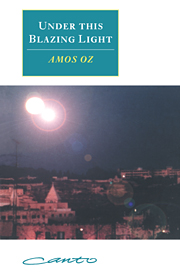Book contents
- Frontmatter
- Contents
- Translator's note
- Preface to the Hebrew edition
- Introduction
- Events and books
- Under this blazing light
- ‘Man is the sum total of all the sin and fire pent up in his bones’
- ‘A ridiculous miracle hanging over our heads’
- The State as reprisal
- A modest attempt to set out a theory
- The meaning of homeland
- The discreet charm of Zionism
- A.D. Gordon today
- Thoughts on the kibbutz
- The kibbutz at the present time
- How to be a socialist
- Munia Mandel's secret language
- Pinchas Lavon
- The lost garden
- An autobiographical note
- An alien city
- Like a gangster on the night of the long knives, but somewhat in a dream
- Notes
- Publication history
- Index of names
The State as reprisal
Published online by Cambridge University Press: 07 September 2010
- Frontmatter
- Contents
- Translator's note
- Preface to the Hebrew edition
- Introduction
- Events and books
- Under this blazing light
- ‘Man is the sum total of all the sin and fire pent up in his bones’
- ‘A ridiculous miracle hanging over our heads’
- The State as reprisal
- A modest attempt to set out a theory
- The meaning of homeland
- The discreet charm of Zionism
- A.D. Gordon today
- Thoughts on the kibbutz
- The kibbutz at the present time
- How to be a socialist
- Munia Mandel's secret language
- Pinchas Lavon
- The lost garden
- An autobiographical note
- An alien city
- Like a gangster on the night of the long knives, but somewhat in a dream
- Notes
- Publication history
- Index of names
Summary
A generation that has grown up in an age of pathos naturally defends itself against every kind of denunciation and indictment with barricades of insensitivity and suspicion. Many of us have a kind of blind spot of depression or hilarity about any raised voice or any platform of preachers. Our reservations and suspicion become seven times stronger when we are confronted not by any old denunciation but by an artistic chastisement that conveys an indictment or a credo in verse, in metre and with poetic imagery. Such complaints are doubly suspect: first, what right has he got to shout at us like that? And, secondly: is this art or is it just smart propaganda? Such is the suspiciousness of our age. Bialik showered us with prophetic fire and brimstone, and then his epigones arrived and got up on their soapboxes and harangued us until we got bored and even started to snigger. So the castigators lost their status, and modern poets all try to whisper their poetry with immense humility. Our suspiciousness is the result of a castigating pose, and it is also the reason for the disappearance of that pose. But my subject is not the change in literary taste; I want to emphasise the greatness and courage of a poet who has not been deterred by this change and who chooses, in this period of suspicion, to adopt the stance of a castigator. Uri Zvi Greenberg writes poems full of religious fervour and roaring chastisements, and he penetrates all the barricades of suspicion, reserve, changing taste, and arouses in us a rare form of excitement and faith. Because he is a great poet.
- Type
- Chapter
- Information
- Under this Blazing Light , pp. 61 - 70Publisher: Cambridge University PressPrint publication year: 1995



